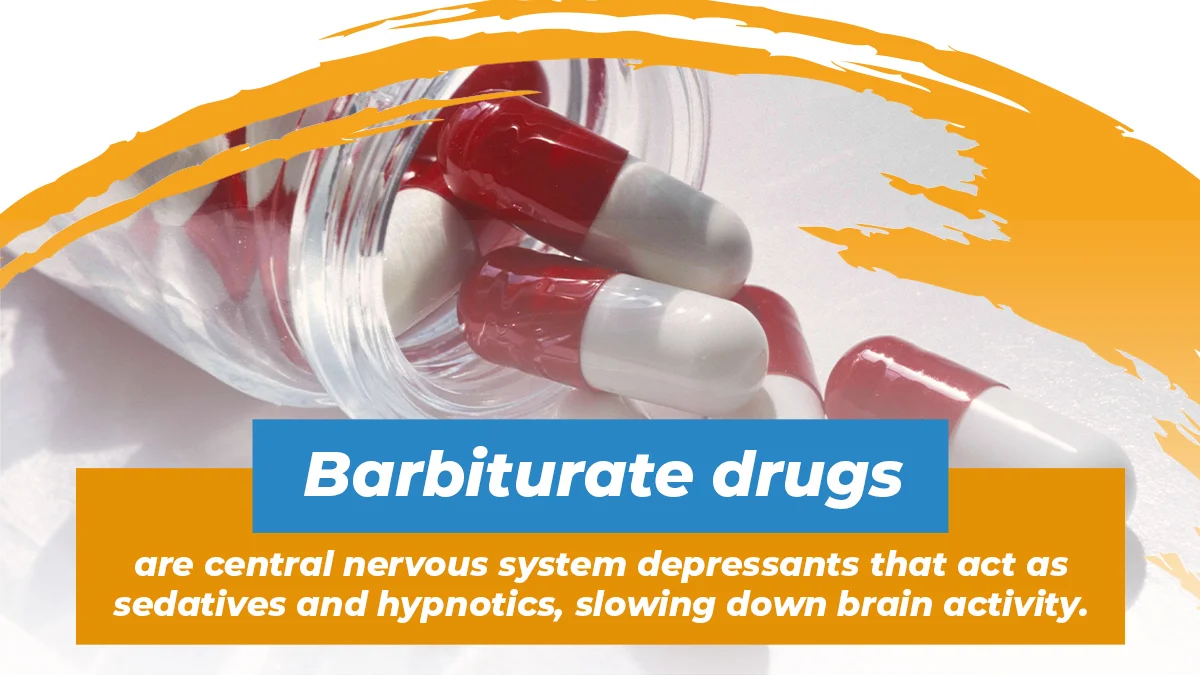What are Barbiturate Drugs?
Barbiturate drugs, a class of central nervous system depressants, have played a significant role in medical history as sedatives, hypnotics, and anticonvulsants. Derived from barbituric acid, these substances affect the brain by depressing the activity.
While once widely prescribed for anxiety and sleep disorders, their use has declined due to the risk of addiction and overdose. Despite their decline in medical practice, they remain relevant in certain medical procedures and are occasionally misused recreationally.
Understanding the properties and risks associated with these drugs is important for informed medical practice and public health.
Key Takeaways
Abruptly stopping the use of barbiturates after prolonged use can result in withdrawal symptoms, including anxiety, tremors, insomnia, and seizures. Here’s what you need to know:
- Barbiturate drugs are central nervous system depressants that act as sedatives and hypnotics, slowing down brain activity.
- Misuse of barbiturates can lead to dangerous respiratory depression and addiction.
- Safer alternatives in medical practice have replaced barbiturates due to their high potential for abuse and overdose.
Contact The Recovery Team at (800) 817-1247 for more information and personalized care for long-term drug recovery.
What Are Barbiturates
Barbiturates are a class of drugs that act as central nervous system depressants, primarily used for their soothing and hypnotic properties. These substances slow down brain activity, inducing relaxation and sleepiness.
Barbiturates were once widely prescribed for various medical conditions, including anxiety and insomnia, but their use has diminished due to the risk of dependence and overdose.
Production and Composition of Barbiturates
Barbiturates are synthesized through chemical processes involving urea and malonic acid derivatives. The core structure consists of a barbituric acid ring, with variations in substituents determining the specific type of barbiturate produced.
The synthesis may involve substituting different alkyl or aryl groups, influencing the drug’s potency and duration of action. These alterations can result in short-acting, intermediate-acting, or long-acting barbiturates.
Types of Barbiturates
Short-Acting Barbiturates: Examples include secobarbital and pentobarbital. They have a rapid onset and are often used for anesthesia.
Intermediate-Acting Barbiturates: Phenobarbital is a common example with a longer duration of action, used for seizure control and as a sleep aid.
Long-Acting Barbiturates: Phenobarbital has a slow onset but a prolonged effect, making it suitable for managing certain seizure disorders.
Mechanism of Action
Barbiturates primarily act on the central nervous system, exerting their effects through modulation of the neurotransmitter gamma-aminobutyric acid (GABA). GABA is an inhibitory neurotransmitter that is essential in regulating brain activity.
Barbiturates enhance the inhibitory action of GABA by binding to specific sites on the GABA-A receptors, which are ion channels responsible for transmitting signals in the brain.
How Barbiturates Act on the Brain
When barbiturates bind to GABA-A receptors, they increase the receptor channel’s duration, leading to hyperpolarization caused by increased chloride ion influx into the neuron.
Essentially, barbiturate pills make it more challenging for the neuron to become excited, suppressing neural activity. This soothing effect is what makes barbiturates effective in treating conditions such as anxiety, insomnia, and seizures.
Effect on the Nervous System
Barbiturates depress the central nervous system, inducing a calming or soothing effect. This results in decreased brain activity, which can lead to relaxation, drowsiness, and, in higher doses, anesthesia.
However, it’s important to note that the use of barbiturates comes with risks, as excessive depression of the nervous system can lead to respiratory failure and overdose. Due to these risks, the medical use of barbiturates has declined in favor of safer medicines.
Understanding the intricate mechanism of action of barbiturates sheds light on their role in altering neural processes and highlights the importance of cautious and controlled administration in medical contexts.
Medical Uses
Barbiturates, a class of central nervous system depressants, find diverse applications in the medical field.
Here are the most common uses of Barbiturates in the United States or worldwide:
Barbiturates in Anesthesia
In anesthesia, barbiturates play a crucial role in inducing and maintaining a state of controlled unconsciousness during surgical procedures. These synthetic drugs act by depressing the central nervous system, resulting in sedation and patient relaxation.
Thiopental, a well-known barbiturate, is often utilized as an intravenous anesthetic, ensuring a smooth and controlled anesthesia experience for patients and medical professionals.
Mental Health Treatment
Barbiturates have historically been employed in the treatment of mental health conditions. These drugs exhibit anxiolytic and sedative properties, making them useful in managing anxiety disorders and certain types of insomnia.
However, due to their potential for dependence and overdose and adverse effects, their usage in mental health treatment has diminished in favor of safer alternatives.
Therapeutic Applications
Beyond anesthesia and mental health, barbiturates have found applications in various therapeutic contexts. They have been utilized as anticonvulsants to control seizures in certain neurological disorders.
Additionally, barbiturates have been employed in the treatment of acute migraine attacks, providing relief to people experiencing intense headaches.
Side Effects and Risks
Barbiturates sedative drugs act as central nervous system depressants. They were once widely used for various medical purposes, such as sedation, anesthesia, and the treatment of anxiety and sleep disorders.
However, their use has decreased due to the development of safer and newer drugs and the risk of serious side effects.
Here are the short-term and long-term effects of barbiturates:
Short-Term Effects
- Sedation: Barbiturates strongly sedate the central nervous system, leading to drowsiness and a feeling of relaxation.
- Impaired Coordination: High doses of common barbiturates can affect motor skills and coordination, leading to clumsiness and difficulty performing tasks that require focus.
- Slurred Speech: Speech may become slurred and difficult to understand due to barbiturate addiction.
- Confusion: Barbiturates can cause allergic reactions, confusion, and cognitive impairment.
- Dizziness and Lightheadedness: People may experience a sense of dizziness or lightheadedness.
Long-Term Effects
- Tolerance: Prolonged use of barbiturates can lead to the development of tolerance, requiring higher doses to achieve the desired effects.
- Dependence: Continued use or high can lead to physical and psychological dependence, making it challenging for individuals to stop using the drug without experiencing withdrawal symptoms.
- Withdrawal Symptoms: Abrupt discontinuation of barbiturate material can result in withdrawal symptoms, including anxiety, mood swings, severe drowsiness, insomnia, nausea, and seizures.
- Cognitive Impairment: Long-term use may contribute to cognitive deficits, including memory and concentration problems.
- Increased Risk of Accidents: Impaired coordination and cognitive function increase the risk of accidents and injuries.
Risk of Overdose
Barbiturate overdose can be life-threatening and may result in the following:
- Respiratory Depression: A severe slowing of breathing can occur, leading to respiratory failure.
- Coma: In extreme cases, overdose can cause a state of unconsciousness from which an individual cannot be awakened.
- Hypotension: Barbiturate abuse can cause a dangerous drop in blood pressure.
- Cardiovascular Collapse: In severe cases, cardiovascular collapse may occur, leading to shock and organ failure.
- Death: A larger amount of medicine can be fatal, especially when combined with other depressant substances like alcohol.
Pregnant women should steer clear of barbiturate use and related recreational drugs, as these can pose serious risks to both maternal health and the developing baby. In addition, abrupt discontinuation of barbiturate medicines should be done under the supervision of doctors and healthcare providers to manage barbiturate withdrawal and minimize the risk of complications.
It is crucial to seek immediate medical attention if you or a family member is regularly using barbiturate products and experiencing signs of overdose or substance abuse.
Your Recovery Is Our Priority
Defeat barbiturate dependence with the comprehensive addiction treatment services of The Recovery Team, designed to guide you toward lasting recovery.
Through our varying yet effective levels of care, we provide comprehensive support to conquer drug dependency. We believe in a holistic approach to healing, integrating evidence-based therapies to guide your journey toward lasting sobriety.
It is time to reclaim control, embrace change, and build a foundation for a healthier, addiction-free tomorrow. Contact us at (800) 817-1247 today.






